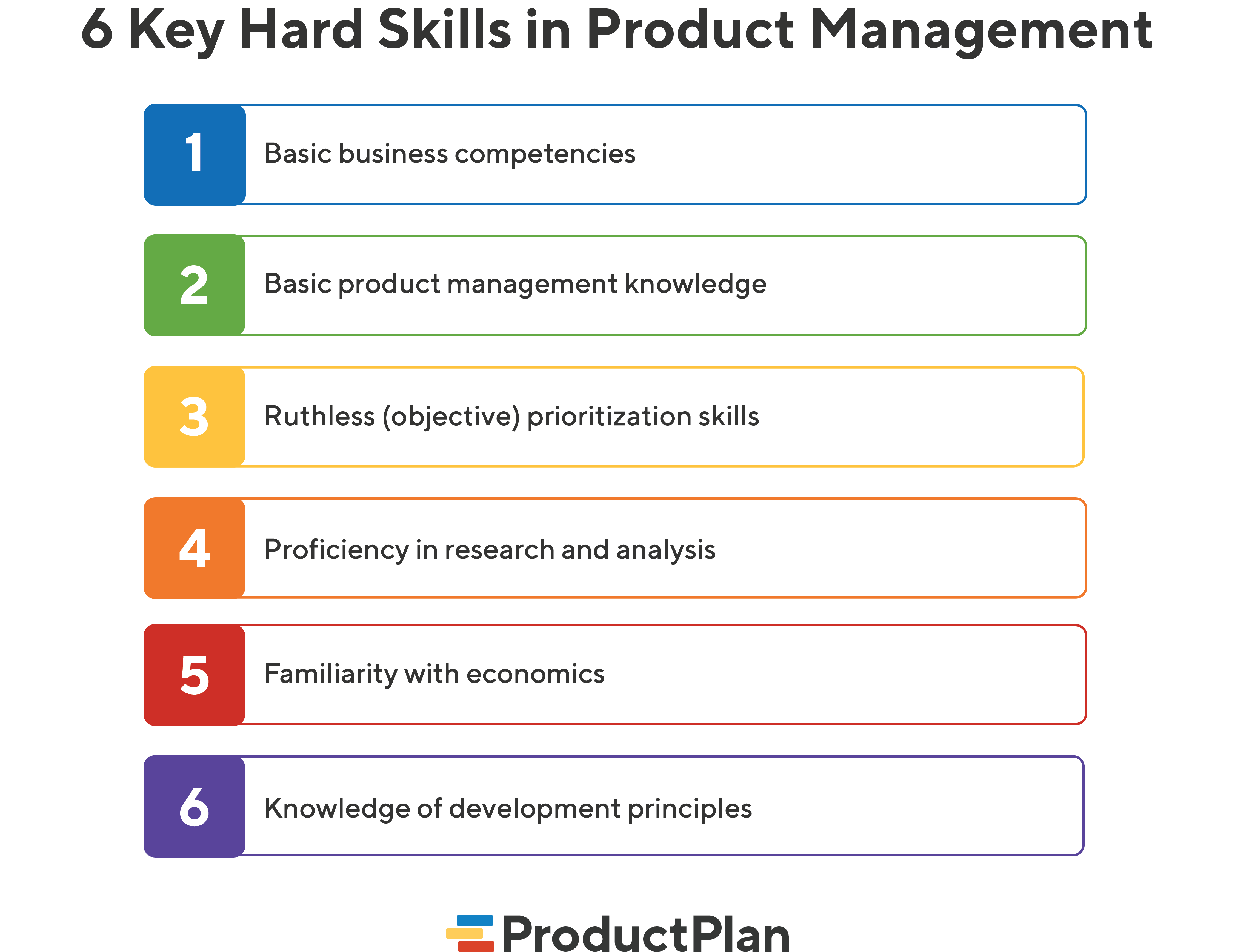6 Key Hard Skills in Product Management
You hear a lot about the need for soft skills in product management. Still, any discussion about product manager soft skills should presuppose you’ve already mastered the specific abilities required for the job: the hard skills. But what are the necessary hard skills in product management?
In this post, we’ll address some of the hard skills we believe product managers should develop. But first, let’s clarify the differences between soft skills and hard skills for product managers. Ashok Bania, Director of Product Management for the popular meditation app Headspace, recently shared his definition of the two with us.
“Hard skills are very pertinent to your role and the work you are doing. They are your technical skills. For example, if you’re a data engineer, hard skills represent how much you know about data, how much you know about models, how much you know about statistics, and so on. Soft skills, however, are not directly pertinent to your job. Soft skills will help you in just about any job and even in your personal life. Things like communication, time management, and focus.” — Ashok Bania, Director of Product Management, Headspace
So what are the hard skills that product managers need? We have compiled a list of 6 essential hard skills that all product managers should master.

6 Hard Skills in Product Management
1. Basic Business Competencies
You don’t need a business or finance degree to be a product manager (although it wouldn’t hurt.) But, you will need some fluency in business basics.
For example, you’ll need to know the difference between revenue and profit, budgeting, cash flow, and how to read a profit-and-loss (P&L) statement.
As a product manager, your role requires you to know the details of your product’s development. Part of this is keeping tabs on other factors within your company that may affect development. Additionally, suppose a stakeholder asks you to discuss revenues for specific products over a certain timeframe or offer your forecasts for future revenues. You’ll need to know how to read, interpret, and articulate these details in that case. By doing this, you not only will offer more value to the organization you work for, but you’ll be more interconnected with those at your company that might be interested in your future products and ideas.
2. Basic Product Management Knowledge
Product management is a sweeping discipline. There are many ways to approach product development, so getting started can seem overwhelming.
One of the most crucial hard product management skills is (surprise!) basic knowledge of best practices in the trade. It’s advised that product managers learn about various frameworks, processes, and methodologies. Much product management is conducting research, developing strategy, communicating plans, coordinating the development, and acting on feedback and data analysis. Fortunately, smart product managers before you have done a lot of this work already and codified it into various product management strategies.
One of the greatest tools for a product manager is the product roadmap. Specific roadmapping software can be a powerful tool in product managers’ toolboxes. This tool allows a product manager to organize complicated ideas easily. Mastering this tool is essential for product managers to develop plans, effectively communicate plans to various stakeholders, and coordinate development.
3. Ruthless (Objective) Prioritization Skills
This is critical to ensuring the engineers are working on what’s most important. But as Isabelle explained, this means that “a lot of our job is saying no… to requests coming in from sales, marketing, customer support, even our stakeholders.”
Knowing how to prioritize and respectfully turn down requests that could upset your product’s strategic priorities is a special skill. And yes, it probably covers a grey area between hard and soft skills. The webinar panel itself was torn on how to categorize it.
Objective prioritization frameworks are helpful for many prioritization decisions. And working knowledge of these frameworks and when and how to use them is a critical product management hard skill. But we believe mastering this ability is important enough to a product manager to deserve a place on this list of hard skills for product management, mainly because you can apply science to it.
4. Proficiency in Research and Analysis
Pivotal’s Director of Marketing, Ronan Dunlop, put it this way:
“Data is vital to a product manager. All forms of data.”
As we’ve pointed out here many times, your product roadmap decisions should be data-driven, not based entirely on your intuition (no matter how well-honed that intuition is). Data can help alert product managers to opportunities or threats in the market. It can guide them to the right places to focus development resources, and it can even help them validate product and feature ideas before allocating resources to them.
But all this assumes that the product manager in question knows:
-
How to conduct market research
-
How to use (or build) tools to compile and analyze data
-
And how to interpret all the data these tools generate
During our webinar, panelist Kevin Steigerwalk, Jama Software’s Vice President of Product, made an interesting point:
“Data can catch you off-guard. You might do your research and think, ‘Now I have all my data points; I’ve told my story and made my business case.’ But then if you present it to someone with more of an understanding of data than you have, they might be able to easily poke holes in your plan.”
Like Kevin, we believe that gaining proficiency in metrics, analytics, and research definitely represents a hard skill every product manager should develop.
5. Familiarity with Economics
You don’t need a degree in economics to be a product manager (although that degree couldn’t hurt, either), but you should acquire at least a basic level of understanding of this discipline.
Think of it this way: Economics is studying how people and societies deal with scarce resources with alternative uses. As product managers, we almost always have some form of this issue. We have too many requests for our team to handle, a planned launch date that doesn’t leave us enough time, or an insufficient budget to hire the personnel we need.
Having a basic understanding of economics goes a long way toward understanding concepts you’ll use every day in this career. These concepts could include the need for trade-offs, costs vs. benefit analyses, future consequences of current actions (think technical debt!), and others.
6. Knowledge of Development Principles
This was the big question for our panel. We’ve also previously raised it ourselves here on the ProductPlan blog: Do product managers have to be technical? In other words, does a product manager working on a technical product need to come from a technical background such as engineering, like Headspace’s Ashok Bania did?
Annie Dunham, ProductPlan’s Director of Product, pointed out certain circumstances where career experience in a technical field helps product managers. For example, if you’re managing products designed for technical users, such as engineers, a technical background may give you empathy and a deeper understanding of those users.
But Annie, who has a technical background, also said situations when that engineering background could undermine an engineer-turned-product manager. “I’ve had technical conversations that go way too long,” she explained. This means there’s some risk of technical product managers putting on their engineer hats and losing focus on the big-picture strategic issues they should focus on as product managers.
So the answer, we believe, is to strengthen your technical muscles—learn to code, take online courses on the technical disciplines in your field—so you can develop a deeper understanding of your products, your users, and your technical colleagues. That’s a hard skill worth honing, and it doesn’t require you to start over and earn a degree in engineering (unless you want to, as it could be beneficial).
First the Hard Skills, Then the Soft
Watch our webinar, Hiring and Growing a Successful Product Team, to learn more about the skills product leaders look for when hiring:
You’ll also want to master at least some hard skills in product management. These commonly include research skills, understanding how businesses operate, and general knowledge of product management best practices. Once you have a solid foundation of hard product management skills, you can start focusing on improving your soft skills to be a well-rounded product manager.








